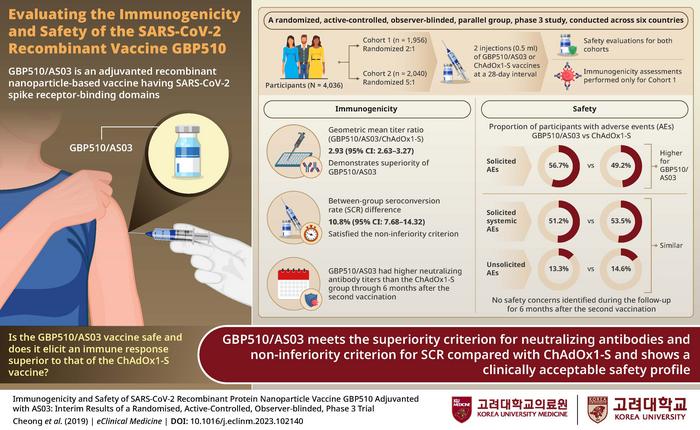The COVID-19 pandemic, caused by the severe acute respiratory syndrome coronavirus 2 (SARS-CoV-2) emerged in December 2019. Since then, extensive efforts have been made to develop and evaluate vaccines to combat the virus. One of the promising candidates is GBP510 a recombinant vaccine adjuvanted with AS03, designed to target the SARS-CoV-2 virus’s spike receptor-binding domains.

Credit: Cheong et al., Korea University
The COVID-19 pandemic, caused by the severe acute respiratory syndrome coronavirus 2 (SARS-CoV-2) emerged in December 2019. Since then, extensive efforts have been made to develop and evaluate vaccines to combat the virus. One of the promising candidates is GBP510 a recombinant vaccine adjuvanted with AS03, designed to target the SARS-CoV-2 virus’s spike receptor-binding domains.
A team of researchers, led by Professor Hee Jin Cheong and Joon Young Song from the Korea University College of Medicine in Seoul, conducted a randomized, active-controlled, observer-blinded, parallel group, phase 3 study across six countries, to assess the immunogenicity and safety of GBP510/AS03, relative to the ChAdOx1-S vaccine.
Their research was published on 7 September 2023 in Volume 64 Issue 102140 of eClinical Medicine. “In the prevailing context where mRNA vaccines have taken the center stage, we examined the outcomes of a preceding phase 1/2 study, that demonstrated the high immunogenicity of the adjuvanted nanoparticle-based vaccine platform GBP510/AS03. This led us to embark on the current study” claimed Professor Cheong.
The participants were split in two groups: those with no prior SARS-CoV-2 infection or COVID-19 vaccination history and those irrespective of these parameters. Each participant based on randomization, received two injections of either GBP510/AS03 or ChAdOx1-S spaced 28 days apart.
The participants from the first group underwent immunogenicity analysis measuring the neutralizing antibody response. The researchers found that the immune response induced by two doses of GBP510/AS03 was superior to that induced by ChAdOx1-S.
The higher neutralizing antibodies with GBP510/AS03 were seen in participants regardless of age, sex, or ethnicity. Regarding safety assessment, GBP510/AS03 demonstrated a clinically acceptable safety profile, and no safety concerns were identified throughout the study period.
The researchers were thrilled with their findings. “The incorporation of an adjuvant into the nanoparticle-based vaccine platform has showcased both a robust ability to enhance the immune response and safety in this extensive phase 3 clinical trial. This development opens up the potential for broad future applications, not only in the creation of new infectious disease vaccines but also in the enhancement of existing vaccines to elevate their safety and efficacy,” said Prof. Song.
***
Reference
DOI: https://doi.org/10.1016/j.eclinm.2023.102140
About Korea University College of Medicine
Korea University College of Medicine is the medical school of Korea University. It is located in Seoul, South Korea. As one of the oldest medical schools in South Korea, it has been historically regarded as one of the country’s top medical schools. The school was founded as Chosun Women’s Medical Training Institute in 1928 by Rosetta Sherwood Hall. The institute was subsequently renamed several times and ultimately merged with Korea University to become Korea University College of Medicine. So far, the school has produced over 7,000 graduates, most of whom are working as prominent physicians and public health advocates worldwide.
About the authors
Hee Jin Cheong and Joon Young Song are Professors in the Division of Infectious Diseases, at Korea University College of Medicine. Their group has conducted studies evaluating the disease burden, immunogenicity, and effectiveness of major infectious diseases in Korea and has been dedicated to developing guidelines for evidence-based adult vaccination. They have published several papers on the efficacy and safety of various vaccines during the COVID-19 pandemic. Prof. Hee Jin Cheong received a PhD from Korea University and began research on influenza and vaccines while she was a visiting scholar at Mount Sinai Medical School in 2002-2003. Currently, she is the chairman of the adult immunization committee in the Korean Society of Infectious Diseases. Prof. Song obtained his PhD from Korea
Journal
EClinicalMedicine
DOI
10.1016/j.eclinm.2023.102140
Method of Research
Randomized controlled/clinical trial
Subject of Research
People
Article Title
Immunogenicity and Safety of SARS-CoV-2 Recombinant Protein Nanoparticle Vaccine GBP510 Adjuvanted with AS03: Interim Results of a Randomised, Active-Controlled, Observer-blinded, Phase 3 Trial
Article Publication Date
7-Sep-2023
COI Statement
François Roman, Thomas Breuer, and Piotr Wysocki are employees of the GSK group of companies. François Roman and Thomas Breuer hold restricted shares in the GSK group of companies. Hun Kim, Ji Hwa Ryu, Su Jeen Lee, and Yong Wook Park are full-time employees of SK Bioscience. Hun Kim, Yong Wook Park and Ji Hwa Ryu own SK Bioscience stock as employees. Sushant Sahastrabuddhe, Manki Song and Naveena D’Cor are fulltime employees of IVI. All other authors declare no competing interests.




